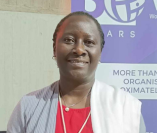Reflecting on Organizational Equity in WONCA
Organizational equity in WONCA examines the relative distribution of power and available resources among key internal stakeholders, including regional presidents, their regional executives, and family doctors in the different Member Organizations (MOs) worldwide. In organizational equity, motivation is affected by the individual's perception of being treated fairly compared to others.
In WONCA, one of the statutory committees is the Organizational Equity Committee (OEC) whose mandate is to:
- Advise Council on all issues concerning equity within WONCA
- Measure and monitor the effectiveness of equity policies of WONCA Council and Executive
- Monitor and report upon progress in equity in WONCA
- Report and make recommendations regarding additional efforts in regard to the nominations of women members for office and awards within WONCA
To improve their mandate, the OEC recommended the formation of Regional Organizational Equity Committees (Regional OECs) to cater to the special equity needs of each of the seven WONCA regions. So far, the OEC has identified several equity priorities that affect interactions in WONCA, including, in ascending order: language, gender, economic, ethnic/racial, broadband, and pandemic equity.
Language equity refers to a sense of isolation due to language and cultural barriers. Gender equity refers to a process of fairness and justice in the distribution of benefits, power, resources, and responsibilities between women and men. In addition, an inclusive approach to gender equity means actively seeking to understand and address the unique challenges and needs of LGBTQ+ people, while also ensuring that everyone feels safe, respected, and valued. Economic equity refers to financial barriers that limit members' participation in WONCA activities, for instance, bank transfers across countries, visas, travel, and accommodation at meetings. Ethnic and racial equity reflects on the transparency and guidelines around the selection of WONCA awards, bursaries, nominations, and elections, which risks exacerbating bias. Broadband equity is achieved when all people and communities can access and use affordable, high-speed, reliable internet that meets their long-term needs. Pandemic equity relates to global disparities in access to personal protective equipment, vaccine availability, and reporting on the deaths of frontline health workers.
The other existing structures in WONCA that contribute to organizational equity are the various Working Parties (WPs) and Special Interest Groups (SIGs). They advocate for equity in their activities and serve as a safe space for WONCA members to articulate and forge ways forward in dealing with potential challenges in their mandate. The responsibility of the OEC will therefore be made more efficient by the creation of Regional OECs. Their work will feed into the regional executive that reports to the WONCA council. This means that the Regional OECs will report findings and recommendations to the regional president, executive and the global OEC.
Regarding organizational equity in WONCA Regions, focus on the selection process for executive posts at the regional level is key. Having an eligibility criterion for the executive post (and not merely being part of a MO) will ensure that those who acquire the post are fit for it. To ensure the effectiveness, representativeness, and integrity of the Regional OECs, the following selection criteria are recommended for appointing members:
- Demonstrated commitment to equity and inclusion which may be demonstrated by:
- A clear track record of engagement in activities that promote Diversity, Equity and Inclusion (DEI), especially in healthcare or organizational settings.
- Familiarity with key equity dimensions as outlined by the WONCA OEC, including language, gender, economic, ethnic/racial, broadband, and pandemic equity.
- Regional representation and diversity, this means that:
- Membership should reflect the demographic, geographic, linguistic, and cultural diversity of the region.
- Individuals from historically underrepresented groups should be proactively included.
- Consideration should be given to equity in representation from high, middle, and low-income MOs.
- Independence from executive roles, therefore:
- Preference should be given to individuals who are not sitting members of the regional executive, in order to maintain an independent equity lens and avoid conflict of interest.
- If regional executives are included, their representation should be minimal and clearly justified.
- Experience in organizational governance or advocacy demonstrated by:
- Prior involvement in committee work, advocacy groups, equity initiatives, or community leadership is desirable.
- Familiarity with WONCA structures (e.g., Council, WPs, SIGs) is advantageous but not mandatory.
- Skills in monitoring, evaluation, and reporting, shown by:
- Ability to critically assess policies, monitor equity-related progress, and contribute to evidence-based recommendations.
- Strong written and verbal communication skills to support effective reporting to the Regional Executive and the global OEC.
- Availability and commitment, to ensure:
- Willingness to attend meetings regularly, contribute actively, and engage with regional stakeholders.
- Commitment to a term of service (e.g., 2 or 3 years), as determined by the regional structure.
- Endorsement by MOs, this may be optional:
- While individuals may apply or be nominated independently, endorsement by a national MO may add weight to the candidacy, provided it does not limit diversity or inclusion.
Let us recall that the purpose of both organizational equity, and policies of DEI were put in place around the globe as initiatives of anti-discrimination against racism, gender discrimination, disability, discrimination on basis of sexual preference and all forms of divisiveness. At a time when there are those on international stage arguing against DEI, it would seem important that thought leaders in health, and particularly those in the major international organization of primary care doctors, WONCA, continue the conversation about DEI, recognizing that discrimination in all forms is harmful to health.
 Jane Namatovu (Uganda),
Jane Namatovu (Uganda),
Chair of the WONCA Organizational Equity Committee
Committee Members:
Elizabeth Reji (South Africa)
Suha Hamshari (Palestinian Territory)
Marjorie Cross (Australia)
Enrique Falceto de Barros (Brazil)
Hina Jawaid (Pakistan)
Jeff Markuns (USA)
Stuart Holmes (United Kingdom)